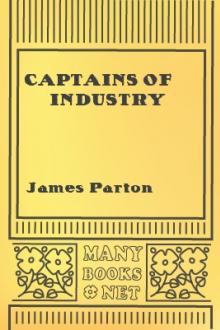Captains of Industry - James Parton (the false prince txt) 📗

- Author: James Parton
- Performer: -
Book online «Captains of Industry - James Parton (the false prince txt) 📗». Author James Parton
"'Boy, bring me the "Register."' The waiter answers, 'Sir, we have no library, but you may see it in the New Exchange Coffee House.' 'Then I will see it there,' answers the disappointed politician, and he goes to the New Exchange Coffee House, and calls for the 'Register'; upon which the waiter tells him he cannot have it, as he is not a subscriber; or presents him with the 'Court and City Register,' the 'Old Annual Register,' or the 'New Annual Register.'"
John Walter was not what is commonly called an educated man. He was a brave and honest Englishman, instinctively opposed to jobbery, and to all the other modes by which a corrupt government plunders a laborious people. The consequence was that during the first years of his editorial life he was frequently in very hot water. When "The Times" had been in existence little more than a year, he took the liberty of making a remark upon the Duke of York, one of the king's dissolute sons, saying that the conduct of his Royal Highness had been such as to incur His Majesty's just disapprobation.
For this offense he was arrested and put on trial for libel. Being convicted, he was sentenced to pay a fine of fifty pounds, to undergo a year's imprisonment in Newgate, to stand in the pillory for one hour, and give bonds for his good behavior for the next seven years. While he was still in prison, he was convicted of two libels: first for saying that both the Prince of Wales and the Duke of York had incurred the just disapprobation of the king; and secondly, for saying that the Duke of Clarence, another son of George III., an officer in the navy, had left his station without the permission of his commanding officer. For these offenses he was condemned to pay fines amounting to two hundred pounds, and to suffer a second year's imprisonment. His first year he served out fully, and four months of the second, when by the intercession of the Prince of Wales he was released.
From this period the newspaper appears to have gone forward, without any interruption, to the present day. In due time John Walter withdrew from the management, and gave it up to his eldest son, John Walter the second, who seems to have possessed his father's resolution and energy, with more knowledge of the world and a better education. It was he who took the first decisive step toward placing "The Times" at the head of journalism. For many years the Walters had been printers to the custom house, a post of considerable profit. In 1810 the newspaper discovered and exposed corrupt practices in the Navy Department,—practices which were subsequently condemned by an investigating commission. The administration deprived the fearless editor of the custom house business. As this was not in accordance with the usages of English politics, it made a great outcry, and the editor was given to understand that, if he would wink at similar abuses in future, the public printing should be restored to him. This offer he declined, saying that he would enter into no engagements and accept no favors which would diminish, in any degree whatever, the independence of the paper.
This was an immense point gained. It was, as I have said, the first step toward greatness. Nor do I believe that any newspaper has ever attained a genuine and permanent standing in a community until it has first conquered a substantial independence. The administration then tried to accomplish its purpose in another way. During the gigantic wars of Napoleon Bonaparte, extending over most of the first fifteen years of the present century, "The Times" surpassed all newspapers in procuring early intelligence from the seat of war. The government stooped to the pettiness of stopping at the outposts all packages addressed to "The Times," while allowing dispatches for the ministerial journals to pass. Foreign ships bound to London were boarded at Gravesend, and papers addressed to "The Times" were taken from the captain. The editor remonstrated to the Home Secretary. He was informed that he might receive his foreign papers as a favor from government. Knowing that this would be granted in the expectation of its modifying the spirit and tone of the newspaper, he declined to accept as a favor that which he claimed as a right. The consequence was that the paper suffered much inconvenience from the loss or delay of imported packages. But this inconvenience was of small account compared with the prestige which such complimentary persecution conferred.
Another remarkable feature of the system upon which "The Times" has been conducted is the liberality with which it has compensated those who served it. Writing is a peculiar kind of industry, and demands so strenuous and intense an exertion of the vital forces, that no one will ever get good writing done who compensates it on ordinary commercial principles. The rule of supply and demand can never apply to this case. There are two things which the purchaser of literary labor can do towards getting a high quality of writing. One is, to give the writer the amplest motive to do his best; and the other is, to prevent his writing too much. Both these things the conductors of "The Times" have systematically done. It is their rule to pay more for literary labor than any one else pays for the same labor, more than the writer himself would think of demanding, and also to afford intervals of repose after periods of severe exertion.
Until the year 1814, all the printing in the world was done by hand, and "The Times" could only be struck off at the rate of four hundred and fifty copies an hour. Hence the circulation of the paper, when it had reached three or four thousand copies a day, had attained the utmost development then supposed to be possible; and when such news came as that of the battle of Austerlitz, Trafalgar, or Waterloo, the edition was exhausted long before the demand was supplied. There was a compositor in the office of "The Times," named Thomas Martyn, who, as early as 1804, conceived the idea of applying Watt's improved steam-engine to a printing press. He showed his model to John Walter, who furnished him with money and room in which to continue his experiments, and perfect his machine. But the pressmen pursued the inventor with such blind, infuriate hate, that the man was in terror of his life from day to day, and the scheme was given up.
Ten years later another ingenious inventor, named König, procured a patent for a steam-press, and Mr. Walter determined to give his invention a trial at all hazards. The press was secretly set up in another building, and a few men, pledged to secrecy, were hired and put in training to work it. On the night of the trial the pressmen in "The Times" building were told that the paper would not go to press until very late, as important news was expected from the Continent. At six in the morning John Walter went into the press-room, and announced to the men that the whole edition of "The Times" had been printed by steam during the night, and that thenceforward the steam-press would be regularly used. He told the men that if they attempted violence there was a force at hand to suppress it, but if they behaved well no man should be a loser by the invention. They should either remain in their situations, or receive full wages until they could procure others. This conduct in a rich and powerful man was no more than decent. The men accepted his terms with alacrity.
A great secret of "The Times'" popularity has been its occasional advocacy of the public interest to its own temporary loss. Early in its history it ridiculed the advertisers of quack medicines, and has never hesitated to expose unsound projects though ever so profusely advertised. During the railroad mania of 1845, when the railroad advertisements in "The Times" averaged sixty thousand dollars a week, it earnestly, eloquently, and every day, week after week, exposed the empty and ruinous nature of the railway schemes. It continued this course until the mighty collapse came which fulfilled its own prophecies, and paralyzed for a time the business of the country.
Was this pure philanthropy? It was something much rarer than that—it was good sense. It was sound judgment. It was not killing the goose that laid the golden egg.
Old readers of the London "Times" were a little surprised, perhaps, to see the honors paid by that journal to its late editor-in-chief. An obituary notice of several columns was surrounded by black lines; a mark of respect which the paper would pay only to members of the royal family, or to some public man of universal renown. Never before, I believe, did this newspaper avow to the world that its editor had a name; and the editor himself usually affected to conceal his professional character. Former editors, in fact, would flatly deny their connection with the paper, and made a great secret of a fact which was no secret at all.
Mr. Carlyle, in his "Life of Sterling," gives a curious illustration of this. Sir Robert Peel, in 1835, upon resigning his ministry, wrote a letter to the editor of "The Times," thanking him for the powerful support which his administration had received from that journal. Sir Robert Peel did not presume to address this letter to any individual by name, and he declared in this letter that the editor was unknown to him even by sight. Edward Sterling replied in a lofty tone, very much as one king might reply to another, and signed the letter simply "The Editor of 'The Times.'"
But all this is changed. The affectation of secrecy, long felt to be ridiculous, has been abandoned, and the editor now circulates freely among his countrymen in his true character, as the conductor of the first journal in Europe. At his death he receives the honors due to the office he holds and the power he exerts, and his funeral is publicly attended by his associates. This is as it should be. Journalism has now taken its place as one of the most important of the liberal professions. Next to statesmanship, next to the actual conduct of public affairs, the editor of a leading newspaper fills, perhaps, the most important place in the practical daily life of the community in which he lives; and the influence of the office is likely to increase, rather than diminish.
Mr. Delane was probably the first individual who was ever educated with a distinct view to his becoming an editor. While





Comments (0)